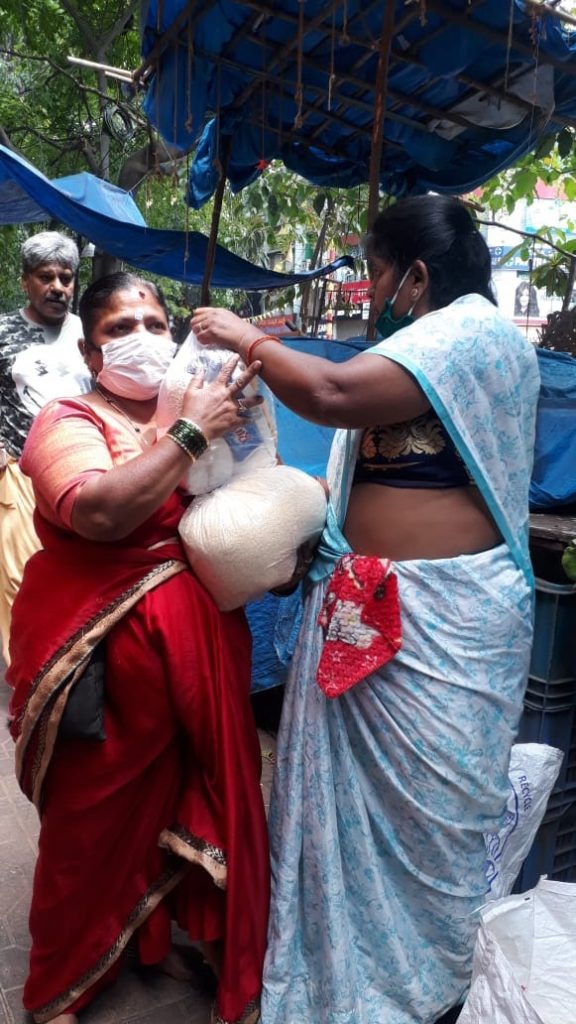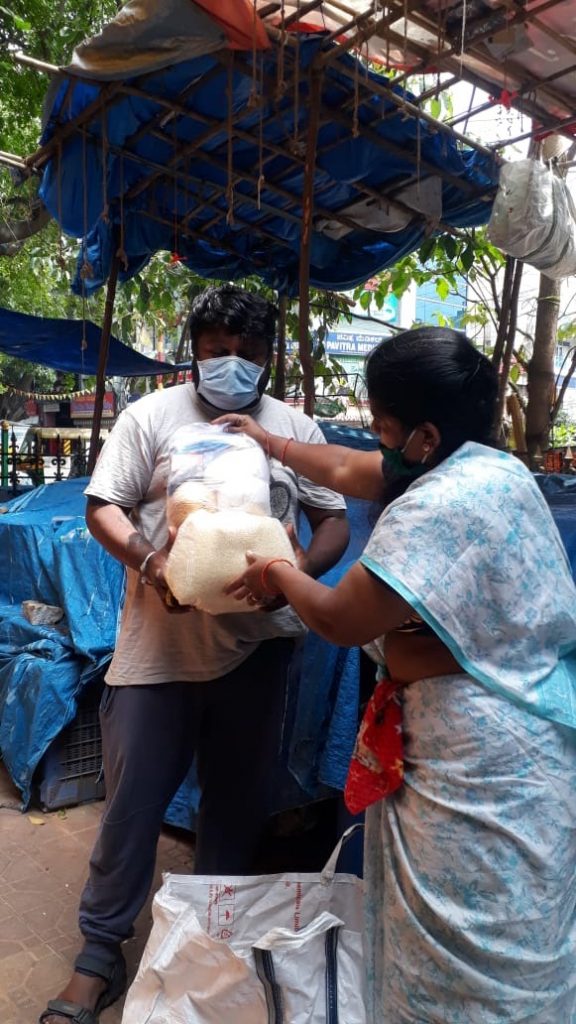ESG’s Support to Communities Adversely Affected by Covid-19 and the lockdown
There is a critical need to support the communities in distress with ration kits and basic health kits.
A crisis of hunger, and consequent malnutrition, is growing within the Covid-19 pandemic. Even as vulnerable communities were trying to recover from the economic hardships of last year’s lockdown, countless families now find themselves exhausting whatever meagre savings they had on food. And they have run out of money already.

Communities currently supported by ESG
- Residents of Slum Housing Board, Bhuvaneshwari Nagar in Subramanyapura, Bengaluru
- The street vendors of Gandhi Bazaar, Bengaluru
- Pastoral Community in Challakere Taluk, Chitradurga District, Karnataka
- Papinayakanahalli and Vaddarahalli, Hospet Taluk, Bellary District, Karnataka
- The fishing community of Champu Khangpok, Manipur
Following over two weeks of the lockdown, auto drivers, garment workers, construction labourers, domestic help, and other such daily wage earners are struggling to support their families.
10 May :This is the case with the communities residing at the Slum Housing Board, Bhuvaneshwari Nagar in Subramanyapura.
In the slum board housing colony of Bhuvaneshwari Nagar, Subramanyapura in South Bangalore, several families go to sleep hungry. There is no effective plan from the State Government or Bruhat Bengaluru Mahanagara Palike (BBMP) to address such crises. To make matters worse, many in the community are falling sick with Covid-19. Living in extremely congested conditions, in 880 poorly ventilated flats (each flat merely 150 sq. ft. in area), it is highly likely that the virus will ravage this community in no time.
The sanitation here is terrible. They have no access to two critical needs for health- sunlight and fresh air. They are also struggling to get safe drinking water. Families – women, kids and elders – have no place to stretch a limb in these cramped and poorly designed flats. Standing in groups just to fetch water from a tanker or a well or from distant places is adding to the threat of catching Covid.
With jobs gone and no money, the food intake is decreasing and compromising essential nutrition. Lack of nutrition is translating into the body losing basic immunity. These conditions are not only making people more vulnerable to getting infected, but also expose them to the risk of rapid deterioration if they fall sick.
During the 2020 lockdown, ESG supported dozens of families in this community by providing dry rations. Similarly, we reached out and helped dozens of families across Bangalore – especially migrant labourers and also street vendors (e.g. Gandhibazaar). This year, as the lockdown is extended and cases are on the rise, these communities rely on our support so they can nourish themselves and stay healthy.
Donors outside India, use the FCRA account provided below


A volunteer from the Subramanyapura community distributing rations procured by ESG. May 15, 2021.
14 May: At Gandhi Bazaar too, the situation is dire.
The street vendors of Gandhi Bazaar are struggling to support their families after over two weeks of lockdown. With dwindling footfall in the market, their incomes have taken a serious hit. Many are struggling to even make enough to cover the rent they pay for their stalls, let alone having money left over to meet the food and medical expenses of their families.
To make matters worse, there has been a spurt in Covid-19 cases among the street vending community. Already, eight vendors have succumbed to the disease. Many more are critically ill, and unable to afford much-needed medication. The ones who are as yet unaffected are fearful of going to work, worried that they too might fall sick. Even as they were trying to recover from the economic hardships of last year’s lockdown, they now find themselves exhausting whatever meager savings they had on food. They have little choice but to put themselves at risk and vend at the bazaar every day, earning whatever they can.
If you contribute, we could help more families with dry ration packages. Our intention is to ensure no one needs to stand in food lines, and that people can cook and take care of their families.
A weekly supply for a family costs about Rs. 1000, with which we can provide rice, pulses, cooking oil, and such other essentials for nutrition and hygiene. That way, we can ensure families can focus investment of their paltry savings on their health needs.


A volunteer from the Street Vendors’ Association distributing rations procured by ESG, during last year’s lockdown.
Every contribution you make, no matter how small, will help these families survive this lockdown and to take care of themselves.
Your contribution will also help us support medical and rental expenses of families in critical need. It will also help us dedicate more time and resources to ensure that the local community has access to clean drinking water by writing to concerned authorities, to help set up mobile clinics for early testing and care for Covid-19 positive patients in these communities, and to design and disseminate awareness material in the community for Covid-19 appropriate behaviour.
With your help, we can extend our support to several other communities that have fallen through the cracks of government assistance and care.
Donors outside India,use the FCRA account provided below
(All Indian donors benefit from tax exemptions under Sec 80G of IT Act. Foreign donations must be routed through ESG’s FCRA linked account as per the FCRA Act.)
Contributions to ESG from foreigners/foreign institutions
Account No: 40113324601 (FCRA SAVINGS ACCOUNT)
Branch Code: 00691
IFSC Code SBIN0000691
SWIFT: SBININBB104
FCRA Cell, 4th Floor, State Bank of India
Sansad Marg, New Delhi Main Branch, New Delhi-110001
20 May: Challakere, Chitradurga District, Karnataka
Even as our newspapers and television screens are filled with news about how the pandemic is raging across cities like Bengaluru, little attention is paid to the plight of people in rural Karnataka. In the village of Ullarthi, Challakere taluk, 10 people have already succumbed to Covid-19 in the second wave. Around 25 more are infected and struggling to recover with the minimal medical facilities available to them. Most fear visiting hospitals due to the high expenditures they might incur, placing their families heavily in debt.
It isn’t just the sick who are in trouble though, even those who are well are facing their own sets of problems. Owing to the lockdown, buses have stopped plying in Challakere. As a result, most villagers who subsist on daily wages have lost their jobs, since they simply have no means to commute to work. With over three weeks of the lockdown having elapsed already, many of the villagers’ meagre foodstocks have already run out. They are struggling to feed themselves, their children and their cattle.
18 May: Papinayakanahalli and Vaddarahalli, Hospet Taluk, Bellary District, Karnataka
Even as the second wave appears to ebb in Bangalore city, it continues to ravage rural Karnataka. Particularly, the villages of Papinayakanahalli and Vaddarahalli in Hospet Taluk, Bellary District are severely affected. The villages are still recovering from the ecological devastation of mining in the area. Many villagers have no land or livelihood and a few are homeless too. The pandemic has only caused further havoc in the region. The number of Covid cases is on the rise and the lack of adequate public healthcare is forcing people to stay unattended at home. Only a few manage to travel all the way to Bellary or Bangalore, hoping to get a hospital bed. And the journey is too strenuous for some to survive. Those who stay at home have little to eat, further making them vulnerable to the infection.
25 May: Champu Khangpok, Manipur
Champu Khangpok is an unique floating village in Loktak Wetland Region – Manipur’s largest freshwater lake. Villagers here live in huts made of wood and bamboo that are kept afloat by phums (rafts made with a complex mix of freshwater floating biomass). As the biomass disintegrates and decomposes over some years, fresh material is added below to lift up the homes – a task the entire community helps with. The 130 family-strong village sustains itself almost entirely by fishing in Loktak lake. The fish is sold through a network of markets owned by women and also transported to other regions across the North East.
This simple way of living intricately linked with nature has been harshly disrupted due to the lockdowns declared across the State of Manipur on account of COVID pandemic. The suspension of public transport and restrictions in markets have made it almost impossible for villagers to sell their fish, leaving them in grave economic distress.
Although the villagers have access to fish and some forms of aquatic vegetables from the lake, they are quickly running out other essential foods: rice, cooking oil and salt. Consequently, the nutritional needs of the community, particularly children, are seriously compromised.
As cases of Covid are rising across Manipur, people of Champu Khangpok are not able to procure medicines and protective masks and sanitisers. This is because they rely entirely, on principle, on row boats (no fossil fuel and pollution – oil, noise, smoke) that does not disrupt the wetland ecosystem. And by the time the reach the shores, accessible shops are closed due to lockdown.
Your immediate monetary support will be extremely helpful. 100% of your financial contribution will go to support the Champu Khangpok people through Indigenous Perspectives, ESG’s partner in Imphal, Manipur.
Contributions to ESG from foreigners/foreign institutions
Account No: 40113324601 (FCRA SAVINGS ACCOUNT)
Branch Code: 00691
IFSC Code SBIN0000691
SWIFT: SBININBB104
FCRA Cell, 4th Floor, State Bank of India
Sansad Marg, New Delhi Main Branch, New Delhi-110001

